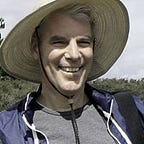Mid-Performance Considerations
(Paris, 2003)
June 21st in 2003 fell on a Saturday.
It was only our second Saturday in Paris, so we didn’t have much to compare it to. But if we’d taken note (even without Linda’s usual thorough reading of her guide books), we would have realized that, from our first stepping out into the market that morning, musicians were performing everywhere. A young woman on accordion, singing broad cabaret tunes for the children in front of the cheese shop, was joined by a strolling bearded man on recorder. And then he continued on, now playing her tunes.
Ah, Paris.
June 21st … June 21st … Why, it’s the Summer Solstice! And (consulting Linda’s guide books) every year in Paris on the Summer Solstice, it is a Fête de la Musique.
(That’s “Festival of Music.” If there’s one thing I learned from my crushing single semester of college French it is that when you see a hat on a vowel, it means an “s” used to appear next. Just ask your host at the hôtel where you’re staying.)
The Festival of Music wouldn’t officially-unofficially begin until sundown—which launches a city-wide street party until dawn. But, this being a Saturday—and a bright sunny one at that (prior to what would be one of the most oppressively bright sunny summers Europe would experience in modern times), we were in for a full-day treat. Musicians on street corners, at Metro entrances, next to fountains, keeping cool.
In the early afternoon, we wandered into the Luxembourg Gardens. And, of course, there was music. An orchestra performing Beethoven?
But then it stopped. Just the opening notes of the Fifth Symphony.
And laughter, and applause.
We followed the sounds, sifting through the brilliant green canopy, along the shaded pathways, to the park’s gazebo, where there was a crowd—an audience—and, yes, a symphony orchestra. At first, it seemed like a monstrously large orchestra, but it was only that the gazebo was merely the size of a house. Musicians were spilling out the sides and onto the pathways and in and among the audience. The audience was similarly large and, in turn, broken, comprised mainly of a single, seated area—in rows of those chairs that are ubiquitous in Paris parks (where do they come from; why have they not all be stolen?). Also, like the spillover musicians, the audience was scattered all around the area, among the musicians and clinging to the rails of the elevated gazebo.
Laughter. Applause.
The conductor was presenting snippets of music from his orchestra for the audience to observe, with lots of between-piece patter. He was very funny, engaging, and instructive, pointing out all kinds of interesting things for everyone to listen for. All in French. In turn, like a pre-speech toddler laughing at all the family jokes, I joined on cue. (Funny how verbal and physical delivery, tone, cadence, and context, convey content in language—any language. It is as though physicality is the true lingua franca of the world, if you will.)
So what was this?
Posters stated that he was Hugues Reiner (whom I’ve since learned is a significant musical director, born in Budapest, my contemporary–1960—who has conducted many important orchestras across Europe, the over-achiever). His performers were “Musiciens Amateurs” from the European Symphony Orchestra. This was like one, big, European-wide community orchestra, with widely varying ages and skills among the performers. Later that evening they would be performing inside the Senate, at the other end of the park (Luxumbourg Gardens is actually the grounds of the French Senate) (so civilized).
Linda and I wandered around the perimeter of the gazebo, among the off-stage percussion section and some stray cellists and a bassoon player. I climbed the sides, here and there, of the gazebo, to stand on the ledge with others from the audience. Leaning over the rail, I could take pictures from practically within the orchestra. The informality of the performance, and permeability of the membrane between audience and performers, made this the best, most-memorable classical music “concert” I’ve ever attended, regardless of language. More than that: as an amateur traveler—a new and brief visitor to a fabled city (with more than its fair share of amateur critics)—this event, accurate in translation or not, was crystallizing into a moment for me. This moment was becoming my Paris.
As Maestro Reiner led one section of musicians to illustrate a point for the educational benefit of his audience, a violinist in my section considered a related point.
